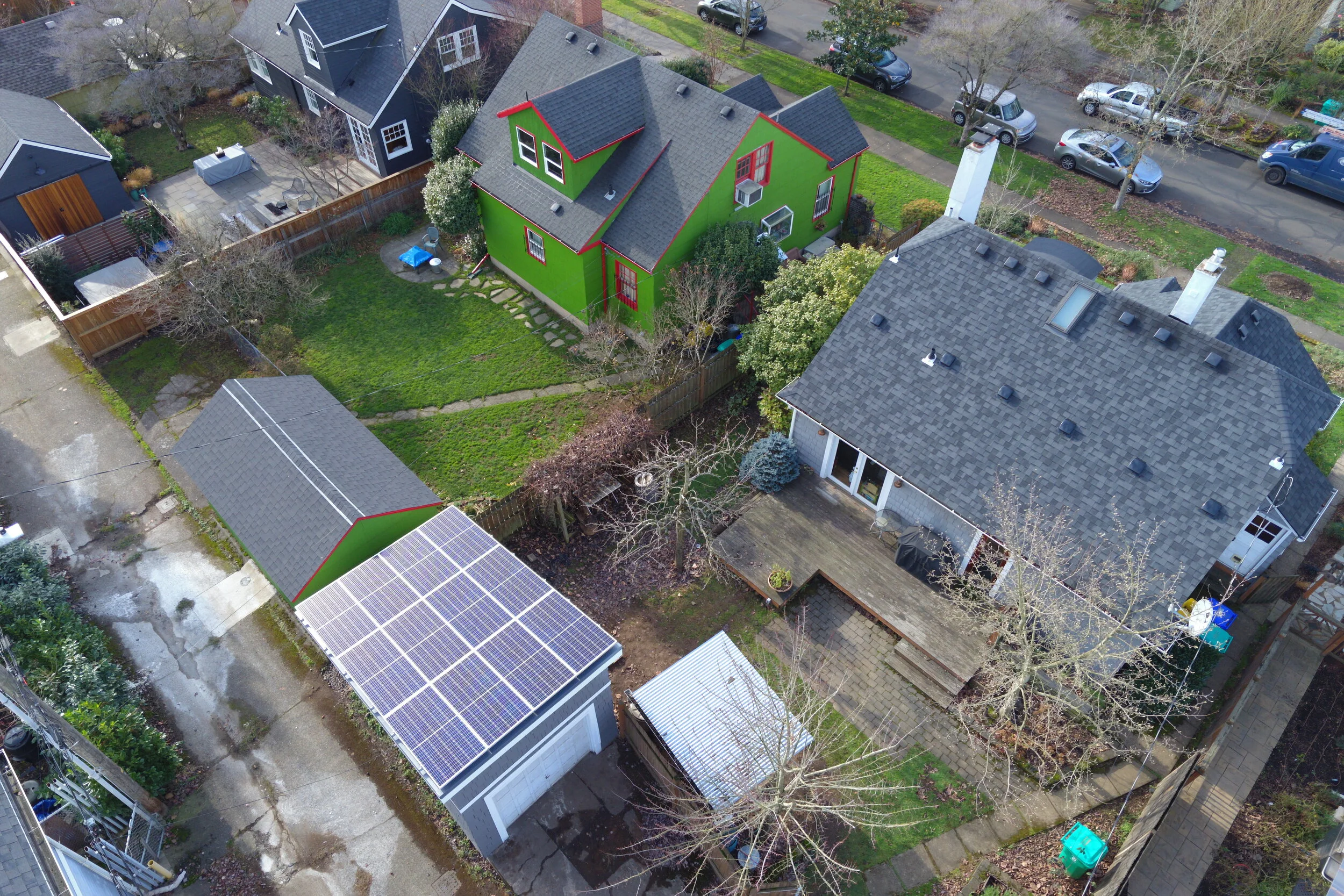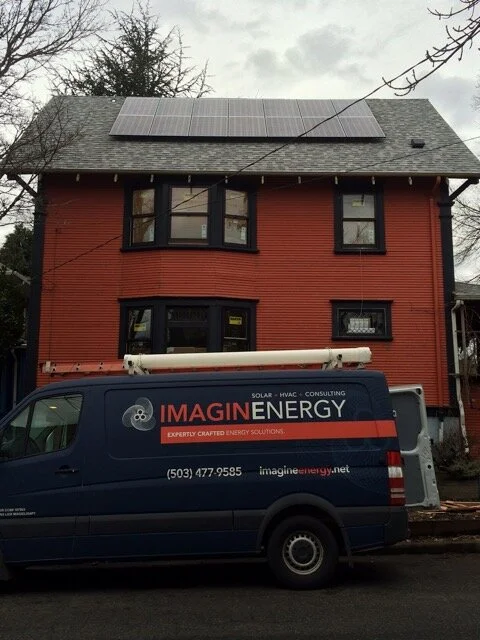
Residential Solar
Why Go Solar?
Solar energy performs very well in the Pacific Northwest due to our cool, sunny springs, and long summer days. In fact, we get just as many sun hours per day as Germany, a country that until somewhat recently led the world in solar energy generation. With enough sun, what value can solar energy provide for you?
Sustainability
We all share responsibility for the stewardship of our environment. As the consequences of climate change continue to become a reality that people are seeing outside their own windows, many are taking the responsibility to act now into their own hands. Some of our clients want to do their part by installing solar panels on their home or enrolling in a community solar program; for some, it’s adding electric vehicle (EV) charging capabilities; and for a few, it has been cutting ties with the utility grid altogether with solar and battery energy storage. Imagine the impact you want to have on the world, and we will work with you to help achieve those goals, for you, for your family, for future generations.

Resiliency
When we started installing solar in 2004, the primary reason people were choosing to install battery energy storage with their PV systems was to power off-grid homes. But as the Pacific Northwest continues to experience climate variations and natural disasters of more frequency and intensity, or at least some growing uncertainty, many more on-grid homeowners are planning for the next significant power outage themselves. Solar power plus battery energy storage systems can now provide you energy independence from the power grid for your critical needs, with additional benefits such as load shifting, smart home energy management, and EV system integration. Our team has designed and installed solar- and battery-based resiliency systems for hospitals, schools, fire departments, municipal water pumping stations, communications networks, and emergency shelters. We bring our extensive solar installation expertise to every project to ensure that when the grid goes down, your lights stay on. Imagine Energy is one of the most longstanding and best solar energy companies in Oregon because we design for your particular needs and will be here to service your critical solar energy system well into the future.
Money
Imagine Energy has worked with many homeowners to achieve their sustainability goals, and we are happy to customize a system that works for you within your budget. For many homes and sites we evaluate, going solar can create substantial financial value. Here are some of the financial considerations we believe are important when evaluating your project:
Levelized Cost of Energy
Levelized Cost of Energy (LCOE) is a financial metric that shows the true cost of a kilowatt hour of electricity produced. To calculate this value we divide the solar installation costs (after all incentives are deducted), financing costs, and lifetime projected operating costs by the expected quantity of electricity your solar system will produce for its useful life. This LCOE calculation gives you the effective cost of your solar energy per kilowatt hour and is the same calculation utilities use in determining the cost of energy produced by traditional power plants. Our most recent quotes for systems purchased outright have featured an average LCOE of $.033/kWh for residential photovoltaic systems in the Pacific Northwest. In contrast, current residential utility rates are between $.13 and $.20 per kWh. Major electric utility providers have increased rates almost 40% since 2021 with an average 16%+ increase in 2024 alone, and these price increases continue to trend upward. Once you own a solar system, your price per KWH for the life of the system is locked in.
Home Value
A 2019 study conducted by Zillow concluded that adding solar to your home increases its resale value by a nationwide average of 4.1%. Going by these figures, Oregon’s median home sale price of $495,042 in 2024 imputes an average increase of $20,297 in home sale price with solar on your roof. With a current average installed price of roughly $3.15/W and a current average system size of 8 kW, or $25,200 before incentives and tax credits, and not accounting for a single kWh of energy production savings on your utility bill, solar starts to look like a pretty smart decision!
Financial Incentives
Financial and tax incentives for residential solar panels often change, so it pays to contact us directly for an up-to-date accounting of what is available to you, but our Incentives and Financing section attempts to make sense of these changes as well.
“Imagine Energy installed a 6.36 kW grid-tied photovoltaic system (including SolarEdge inverter and backup battery) at our home. The turnaround from proposal to installation exceeded expectations. The Imagine Energy Solar team has kept an eye on our system and done some spot maintenance (at no additional cost) to ensure a long life span of this system. If you are considering a residential or commercial photovoltaic system in the Portland metropolitan area, make sure that you call Imagine Energy first.”
— Josh H.

Residential Services
What Can Imagine Energy Do For My Home?
We understand that homeowner goals can vary widely. That’s why instead of offering you a one-size-fits-all package, we regard every new project as unique and design your new renewable energy system or resiliency system accordingly.
Rooftop Solar
We have the experience and knowledge to install solar panels on any rooftop you bring to us. Our rooftop solar installations are expertly designed and aesthetic. We want anyone that comes along twenty years from now to inspect your Imagine Energy solar power system and to marvel at its durability and craft.
Ground-Mounted Solar
Some homeowners are intent on going solar but might not have the ideal rooftop. For those with open space around your residence, a ground-mounted system could be an excellent option.
Backup Energy Storage
Battery energy storage systems can be an essential element to your home's resiliency model: They can provide energy independence from the power grid for your critical needs, with additional benefits such as load shifting, smart home energy management, and EV system integration. And the technology is getting more powerful, efficient, and cost-effective every year! If there is one thing we have learned over the past many years, it’s that every homeowner's energy needs are unique, and there can be no one-size-fits-all solution to energy management––our designs must reflect this. But for most homeowners, the addition of a battery energy storage system to solar power provides invaluable functionality, security, and peace of mind, while future-proofing your home energy system for many years to come.
Electric Vehicle Charging
Chances are, either you or someone you know already has an electric vehicle (EV) and loves it. The wide range of new EVs coming to market demonstrate EV technology is advancing rapidly, and so is its adoption. But it's your EV charger that makes it go! The latest solar inverters can charge your EV(s) using direct current (DC), which is substantially faster and more efficient than plugging your car into your home's electrical outlet. We’ve installed hundreds of stand-alone and inverter-based EV chargers over the years, and built many more systems "EV ready". Even if you’re just thinking about an EV a few years out, it may make sense to incorporate a EV charger into your new home energy system now.
“Imagine Energy has a wealth of experience in solar project designing and construction, offering simple engineering solutions to complex problems. Their attention to detail and commitment to the customer truly sets them apart.”
— Ryan S.

Incentives & Financing
Financial Incentives
Going solar is a good thing for your community and for your wallet, and there are a variety of financial incentives in the Pacific Northwest available to assist your project:
2022 Inflation Reduction Act (IRA):
The 2022 Inflation Reduction Act provided substantial new incentives for residential solar energy systems, including a 30% nonrefundable federal tax credit on nearly all related project expenses, notably with no cap on the project's cost. In other words, if it's a residential solar energy project, however large, it's eligible. This solar tax credit is available to you for any project installed through 2032. The legislation’s tax credit also includes any energy storage system (battery backup) over 3 kWh in capacity, and standalone energy storage systems are also now eligible for this credit. The IRA ensures there really has never been a better time to go solar!
Energy Trust of Oregon (ETO):
The Energy Trust of Oregon provides cash rebates that offset the purchase price of your system. In Oregon, these rebates are available to Portland General Electric (PGE) or Pacific Power customers and vary throughout the year based on funding availability. Imagine Energy is a long-time Energy Trust of Oregon Trade Ally and will ensure you receive the highest rebate available for your system.
Oregon Department of Energy (ODOE) Solar + Storage Rebate Program:
The Oregon Solar + Storage Rebate Program has issued rebates for solar electric and paired solar plus battery backup systems for residential customers in Oregon. Rebates are issued to approved contractors such as Imagine Energy, and we pass the savings on to you up front! For low- and moderate-income customers, rebates cover $1.80 per watt (DC) of installed capacity, up to 60% of the net cost* or $5,000, whichever is less. For homeowners not considered low- or moderate-income who are also eligible for an electric utility incentive, it provides rebates of $0.20 per watt (DC) of installed capacity, up to 40% of the net cost or $5,000, whichever is less. And for homeowners not considered low- or moderate-income who are not eligible for an electric utility incentive, it provides rebates of $0.50 per watt (DC) of installed capacity, up to 40% of the net cost or $5,000, whichever is less. The maximum rebate is $5,000 for a solar electric system and $2,500 for an energy storage system, and funding is still available for all parties.
*ODOE defines the net cost of a system as the total of all eligible costs minus any incentive provided by an electric utility or by Energy Trust of Oregon.
Financing
Our business is to build and maintain solar energy systems for our clients in the Pacific Northwest. We are not in the financing business, so there are no conflicts of interest in our sales and design process, and there are no magic numbers. We offer you the best price we can upfront, and we deliver what we promise. But affording a solar energy system upfront can be a challenge for many clients, and financing is often a critical part of the equation. While flexibility and affordability are often primary considerations, we've found that everyone’s situation is different. What is most important to you? Whether your focus is on the interest rate, total financing cost, monthly payment, downpayment, or prepayment penalty, our solar sales engineers can help you make sense of your options. Transparency is fundamental to our process. We have relationships with several financial institutions active in the Pacific Northwest that our clients have found to offer seamless approval processes and competitive loans for solar, including:
PSCCU is a cooperative credit union that has provided our clients solar specific loans in both Oregon and Washington. They offer competitive rates; require no down payment; can finance battery systems and EV charging stations in addition to the solar system; and can usually get you approved same day. Many of our clients have used PSCCU Learn more about their SustainableSolar loans here.
Banner Bank offers personal home improvement loans with competitive rates up to $15,000 and has no equity requirements. Learn more about Banner Bank’s home improvement loans here.

Contact us now to start your free solar consultation.
Residential Solar
Project Gallery















